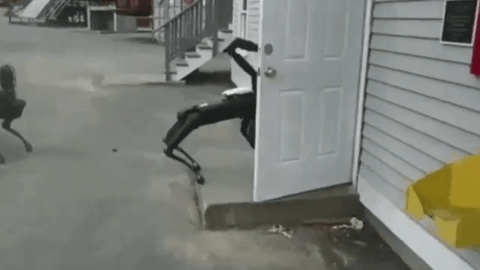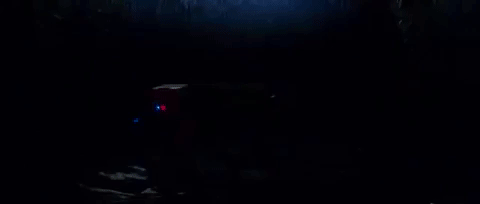Spot, Boston Dynamics’ robot dog, has joined a police squad

MSP
- Spot is a four-legged, semiautonomous robot developed by Boston Dynamics.
- The robot has been used in at least two police “incidents,” according to documents obtained by the ACLU.
- The ACLU said that government agencies should be more transparent about how they plan to use robots in the field.
Spot, the robot dog from Boston Dynamics, is working with a police squad
Massachusetts State Police (MSP) has used Spot — it’s four-legged and semiautonomous — in at least two police “incidents,” according to documents obtained by the American Civil Liberties Union of Massachusetts.
The documents, first reported by Ally Jarmanning at WBUR in Boston, describe Spot as a “mobile remote observation device” that is an “invaluable component of tactical operations” for state police, but they don’t elaborate on the two “incidents” in which the robot was involved. In September, Boston Dynamics began leasing Spot to companies that might benefit from having a robot helper in the field: construction firms, oil, and gas companies, etc.
In dangerous police situations, Spot could help officers identify the location of suspects or bombs, sense hazardous gases and inspect suspicious packages.
“Robot technology is a valuable tool for law enforcement because of its ability to provide situational awareness of potentially dangerous environments,” state police spokesman David Procopio wrote in the documents. Spot’s features include:
- Top speed: 3 mph
- Average runtime: 90 minutes
- Carrying capacity: 30 pounds
- 360-degree, low-light camera
- Extendable arm
What Spot isn’t equipped with is a weapon: Boston Dynamics vice president for business development Michael Perry told WBUR that the agreement with MSP included a clause that Spot cannot be used to “physically harm or intimidate people.”
“Part of our early evaluation process with customers is making sure that we’re on the same page for the usage of the robot,” he said. “So upfront, we’re very clear with our customers that we don’t want the robot being used in a way that can physically harm somebody.”
Still, some have expressed concern over the lack of transparency and regulations in police departments using autonomous robots.
Is using robot police dogs worth the risks?
Police departments in the U.S. have used robot helpers for years. In 2016, Dallas officers used a robot loaded with explosives to kill the man who murdered five police officers during a protest, in what was the first time a police robot has been used to kill a suspect. No charges were filed against the officers behind the controls of that police robot.
However, with new technology comes new concerns about how exactly officers will employ semiautonomous robots in the field.
“There is a lot we do not know about how and where these robotics systems are currently deployed in Massachusetts,” Kade Crockford, Technology for Liberty program director at the ACLU of Massachusetts, told Gizmodovia email.
In addition to weaponization, Crockford said it’s possible for police departments to use Spot with other technologies, for purposes such as surveillance.
“We just really don’t know enough about how the state police are using this,” Crockford told WBUR. “And the technology that can be used in concert with a robotic system like this is almost limitless in terms of what kinds of surveillance and potentially even weaponization operations may be allowed.”
Boston Dynamics said the agreement with MSP is its only “public safety-focused relationship to date,” and that robots like Spot can help save officers’ lives.
“Sending a nimble robot like Spot into these situations can remove humans from potentially life-threatening environments and provide emergency responders with better situational awareness of a crisis,” the company’s staff wrote in an email to Gizmodo. “These are the same capabilities that oil and gas, electric utility, nuclear decomissioning [sic] and mining customers will use to perform critical safety inspections without exposing people to risk.”
In a statement to TechCrunch, Crockford said that the public “urgently need[s] more transparency from government agencies, who should be upfront with the public about their plans to test and deploy new technologies.”





